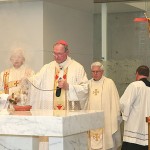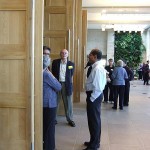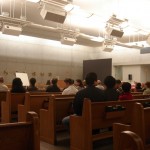A while back I was visiting a family and enjoying a great meal. One of their daughters was home on a visit. She was an enjoyable free spirit but drove her parents crazy with her free and sometimes wild life style.
In the course of the evening she cornered me and asked – how can I be sure there is a God? Any priest is asked that question many times. I don’t know how it came about but I answered,’ well I’ll start with a man on a cross and we’ll go from there.
This is how St. Paul instructed the first Christians of Corinth. I handed on to you as of first importance – first importance-that Christ died for our sins in accordance with the scriptures, and that he was buried and that he was raised on the third and that he appeared to Cephas and the twelve.
We start with the man on the cross Jesus the Christ. St. John tells us ‘in the beginning was the word and the word was with God and the word was God and the word became flesh and dwelt among us.’ St. Paul tells us Jesus was in the form of God but did not consider equality with God as something to be exploited but emptied himself taking the form of a slave, being born in human likeness and he became obedient to the point of death, even death on the cross. For this God highly exalted him – by raising Jesus from the dead – and gave him a name above every other so that every tongue should confess Jesus Christ is Lord to the glory of God the Father.
The man on the cross, nails though hands and feet, crowned with thorns, his naked body showing the brutality of his scourging is the love of God made visible. For God so loved the world he sent his son to the world not to condemn us but to make us one again with God. By his wounds we are healed, by his wounds we are reconciled with God for Jesus made peace by the blood of the cross.
To make it clear the Jesus’ sacrifice of his life to the Father was acceptable the Father raised Jesus from the dead, death had no power over him anymore. The Risen Christ appeared to Peter and the 12 and finally to Paul and commissioned to proclaim to the world the good news of God’s love and mercy for all of us. This is the message of first importance.
How do know there is a God, how do we know there is someone, not a force or a power, but someone who made us and loves us and heals and sustains us and challenges us to be men and women of justice, love and peace? How do we know there is a God – some one – who sustains us when we, like the fishermen in the gospel who worked the boat and struggled with the nets all through the night and came up with nothing, just we struggle and strive to cope with our weaknesses, try to maintain healthy relationships, try to respect and accept men and women different from ourselves, try to be responsive to the poverty in our city, try to be sensitive to the sufferings of people have lost everything, people who are persecuted for their religious beliefs and yet we seem to make little progress in our prayer life, we still remain locked up in our own little worlds.
I don’t think I made much progress with this young lady. Maybe she asked the question just to keep the conversation going. Someone described a mindset like hers as an unrestrained celebration of choice, the human will is worshiped as the ultimate reality. So many people are convinced there is no standard of truth and goodness outside of ourselves before which we seek guidance. We make the truth, we decide what is good. Nobody, nobody has any right to tell what to do, how to love, how to live. We have no duty, no responsibility, no obedience to any authority other than ourselves.
The man on the cross means nothing to so many people. This is a great sadness. But for we who believe – Christ crucified is the power of God and the wisdom of God and the love of God made visible for all those who wish to see.
As we continue to celebrate this Mass at which we re-present the Passion, Death and Resurrection of Christ we pray for ourselves and for each other that the daily living or our lives will always be sustained and inspired by the life-giving death of the man on the cross.
 Founded by St. Paul of the Cross, every Passionist takes a special vow to spend his or her energies in promoting remembrance of the sufferings of Jesus, the memory of the Cross, and reflection of the meaning of the Cross for the world.
Founded by St. Paul of the Cross, every Passionist takes a special vow to spend his or her energies in promoting remembrance of the sufferings of Jesus, the memory of the Cross, and reflection of the meaning of the Cross for the world.




